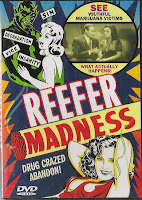 Medical marijuana is dominating the news again. Last week, Congress defeated a measure that would have prevented the U.S. government from blocking the use of medical marijuana in states that allow it. On the same day, Wednesday, July 26, 2007, federal agents raided 10 marijuana clinics in the Los Angeles area. Seems like this battle will continue to rage on.
Medical marijuana is dominating the news again. Last week, Congress defeated a measure that would have prevented the U.S. government from blocking the use of medical marijuana in states that allow it. On the same day, Wednesday, July 26, 2007, federal agents raided 10 marijuana clinics in the Los Angeles area. Seems like this battle will continue to rage on.
On the one side, you’ve got medical marijuana activists, which are really Legalize Pot advocates, and on the other, the federal government, or in some people’s opinions, the moral majorists. Basically, the former group wants the legalization of what they consider a benign substance, while the latter believes that all controlled substances are a danger to society.
I find this an interesting debate because it almost seems silly that a substance like marijuana would be illegal when taken in context to liquor, tobacco, and pharmaceuticals, all of which are more physiologically harmful to the body (for a laugh you have just got to see what the man on the street says about it all). Along with that, consider the benefits the government would achieve through legalization, like taxation and control, you know, things governments typically care about. It’s not like it wouldn’t be lucrative. I mean, doesn’t Snoop Dog still live here?
On the flip side, the medical marijuana clinics aren’t helping their cause any by supplying healthy customers with pot. These “clinics” are exploiting gray areas to basically operate as legal drug dens. Hey, I’m the first one to say that we should legalize marijuana – prostitution too – but first we’ll have to overcome our deep-rooted puritanical mores. Until then, well, the law is the law.
Until then, well, the law is the law.
What I find particularly hysterical is that opponents to marijuana legalization (I’m using the term opponents here loosely – please play along) are looking for anything to rationalize their position. They are feeling hard pressed to show that marijuana use is harmful, so the best they can come up with is that pot smokers may be at a higher risk for schizophrenia and other psychotic illnesses.
Let’s get serious here. First, these results come from a meta-analysis (a comparative study) of 35 studies done over the last 27 years and not a single clinically controlled study. This means that the conclusions have been extrapolated and are therefore not definitive, not at all. Further, we have no way of knowing whether the mental illnesses observed were due to marijuana use, or whether the mentally ill are more likely to smoke marijuana. Basically, this is a flawed study. Even the study’s authors admit that “it may be impossible to establish for sure whether cannabis causes psychosis on the basis of current methods.”
But wait; before you start thinking that there are no health risks associated with marijuana use, think again. Pot smoking is hard on the lungs, so it could affect respiratory function (increased coughs, asthma, and upper respiratory infections) and cardiovascular capacity. Interestingly, though, it does not increase one’s chances of developing lung cancer.
It has other physiological consequences too, like possible dizziness, confusion, light-headedness, racing heart, agitation, feeling of tenseness, dry mouth, increased appetite, and loss of coordination. Marijuana also has cognitive consequences like short term memory loss, paranoia, anxiety, interruption of linear memory (difficulty following a train of thought), altered sense of time, psychological dependence, and loss of motivation.
So don’t think that pot smoking is all just fun and games – it has its risks too. But as I’ve said before, compared to some other substances that are perfectly legal in this country, marijuana does seem a bit lite by comparison.












